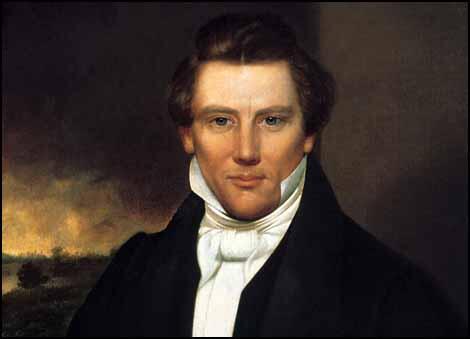Joseph Smith
Joseph Smith was born in Sharon, Vermont, on 23rd December, 1805. At the age of 14 Smith had what he described as a intense spiritual revelation of God and Jesus Christ.
On 22nd September, 1827, Smith claimed that an angel, Moroni, had directed him to a collection of engraved golden tablets that had been buried in a hill near Palmyra, New York. Smith argued that a prophet named Mormon had produced the tablets over a thousand years ago. The tablets contained the history of Native Americans and according to Smith these people were the descendants of ancient Hebrews who had arrived in America to spread the word of God.
Smith published the Book of Mormon in 1830. Later that year he founded the Church of Jesus Christ of Latter-day Saints in Fayette, New York. The headquarters of the church was moved to Kirkland, Ohio, in 1831. The Mormons were forced west in order to achieve freedom from persecution. In 1834 Smith and his loyal follower, Brigham Young, went on a Mormon march to Missouri. This became the new headquarters until the Mormons moved to Illinois in 1840 where they established the community of Nanvoo.

By 1843 the Mormons had over 20,000 members. Mormon views on plural marriage created a great deal of local hostility although Smith himself only acknowledged one wife, Emma Hale Smith, who bore him nine children.
When the local newspaper criticised Mormon men for having several wives, Smith ordered some of his followers to destroy its printing press. Smith and his brother, Hyrum Smith, were imprisoned for the crime. On 27th June, 1844, 150 masked men broke into Carthage jail and killed Smith and his brother.
Primary Sources
(1) Horace Greeley interviewed Brigham Young for the New York Tribune in 1859.
Horace Greeley: What is the position of your church with respect to slavery?
Brigham Young: We consider it of divine institution and not to be abolished until the curse pronounced on Ham shall have been removed from his descendants.
Horace Greeley: Are any slaves now held in this territory?
Brigham Young: There are.
Horace Greeley: Do your territorial laws uphold slavery?
Brigham Young: These laws are printed; you can read for yourself. If slaves are brought here by those who owned them in the states, we do not favor their escape from the service of those owners.
Horace Greeley: How general is polygamy among you?
Brigham Young: I could not say. Some of those present (heads of the church) have each but one wife; others have more; each determines what is is his individual duty.
Horace Greeley: What is the largest number of wives belonging to any one man.
Brigham Young: I have fifteen; I know no one who has more; but some of those sealed to me are old ladies whom I regard rather as mothers than wives, but whom I have taken home to cherish and support.

